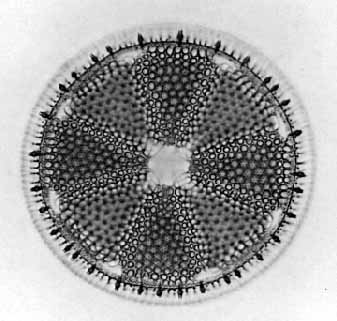
The ecological, commercial, and research values of photosynthetic algae have remained largely unrecognized by corporate and governmental decision makers as well as the general public. Algae are crucial in global processes such as carbon fixation and the global food chain. They are known already to be potentially rich sources of fine
 |
|---|
| A centric diatom. Diatoms are unicellular algae that are exceedingly important components of phytoplankton, photosynthetic organisms that are suspended in the water. Courtesy: Ray E Evert. |
The survey identified six broadly defined research and educational goals in phycology. Specifically, these goals were: (1) to incite public and legislative awareness of the myriad functions played by algae that are critical to global processes; (2) to describe and characterize the wealth of algal biodiversity that resides in ecologically distinct habitats; (3) to gain an increased understanding of the way in which algae interact or coexist with other living organisms; (4) to comprehend the manner and the extent to which ecological processes, such as carbon and nitrogen cycling, are affected by algae; (5) through comparative studies of algae with other organisms, to further our knowledge regarding the mechanisms by which basic cell structure and functions may have evolved in plants, animals, and protists; and (6) to develop the large commercial potential of algal products derived from unicellular and macrophytic species.
Research area priorities that have been assigned to these goals include studies in: molecular and cellular phycology; ocean primary productivity and global climate change; integrative ecology; algal biodiversity and systematics; and applied phycology and biotechnology. Basic research funding remains one of the most critical needs in phycology. The National Science Foundation has recently initiated funding through PEET (Partnership for Enhancing Expertise in Taxonomy) that will address program funding needs for algal biodiversity studies. PEET grants are targeted for the identification and cataloging of poorly described or undescribed protists, aquatic organisms, and other associated taxa that play central roles in primary food chains and associated ecosystems. However, in other research areas, algal studies often fall between the cracks of funding agencies, possibly because of a misconception that algae are unimportant with respect to agricultural plant and animal systems. Finally, there has been only limited industrial support for applied research areas, such as algal mariculture, extraction of fine chemicals, and the detection and control of algal toxin production. In addition to these concerns, there is also the need to provide enhanced training and support for undergraduate and graduate students in the research areas described. This commitment would ensure that the progress made in algal research today will continue strongly into the next century.




